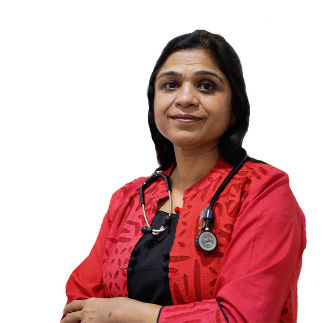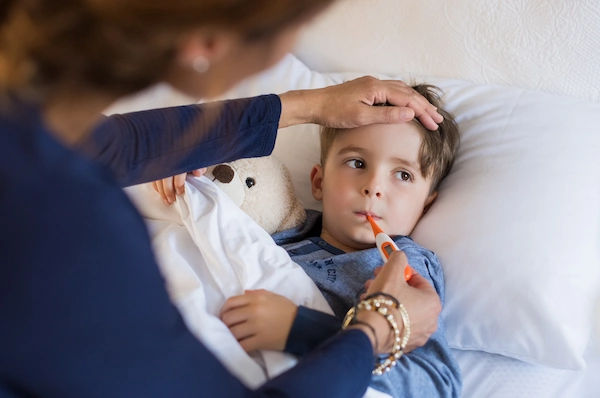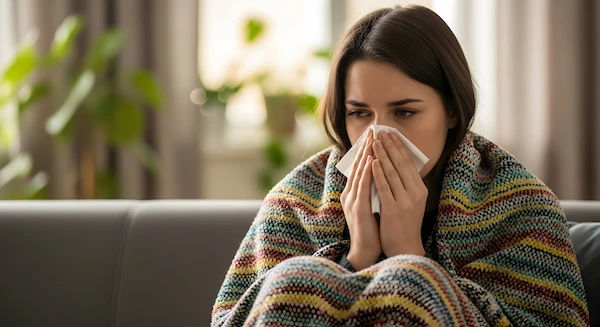How to Reduce Fever In Baby Naturally?
Worried about your baby’s fever? Discover gentle, natural remedies to reduce fever in babies and keep them comfortable at home, with signs to watch for and when to see a doctor.

Written by
Last updated on 13th Jan, 2026
Introduction
As a parent, seeing your baby with a fever can be very worrying. Fever is the body’s natural response to infections like colds, flu, or other illnesses. While it’s a sign that your baby’s immune system is working, it’s important to bring the fever down to keep them comfortable. In most cases, mild fevers can be managed at home with simple, natural remedies.
Understanding Fever in Babies
A fever is when your baby’s body temperature rises above the normal range (98.6°F or 37°C). For babies, a rectal temperature of 100.4°F (38°C) or higher is considered a fever.
Common causes of fever in babies include:
Viral infections (cold, flu, stomach virus)
Bacterial infections (ear infection, urinary tract infection)
Teething (mild fever may occur)
Immunisations (some vaccines can cause a low-grade fever)
Following are the signs indicating your baby has a fever:
Warm forehead or body
Flushed cheeks
Sweating or chills
Fussiness or crying more than usual
Poor appetite
Sleepiness or restlessness
If your baby is under 3 months old and has a fever, seek medical help immediately. For older babies, you can try natural remedies first, but consult a doctor if the fever persists or worsens.
Natural Ways to Reduce Fever in Babies
Here are some safe, natural ways to help lower your baby’s fever at home.
1. Keep Your Baby Hydrated
Fever can lead to dehydration, so offer plenty of fluids:
Breast milk or formula (for infants)
Water (for babies older than 6 months)
Oral rehydration solutions (ORS) if recommended by a doctor
2. Dress Your Baby Lightly
Overdressing can trap heat and worsen the fever. Dress your baby in light, breathable clothing. Avoid heavy blankets—use a light sheet instead.
3. Lukewarm Sponge Bath
A lukewarm sponge bath can help bring down the fever:
Use room-temperature water (not cold water, as it can cause shivering).
Gently wipe your baby’s forehead, neck, armpits, and groin.
Avoid alcohol rubs—they can be harmful.
4. Keep the Room Cool
Ensure the room is comfortably cool (not too cold). Use a fan at low speed to circulate air but avoid direct airflow on the baby.
5. Encourage Rest
Rest helps the body fight infections. Let your baby sleep as much as needed and avoid too much activity.
6. Use a Cool Compress
Place a damp, cool washcloth on your baby’s forehead for a few minutes at a time. Re-wet it as needed.
7. Monitor Temperature Regularly
Check your baby’s temperature every few hours to see if the fever is improving. Use a digital thermometer for accuracy.
8. Foods That May Help
For babies eating solids, try:
Fruits like bananas, applesauce, or mashed pears (easy to digest)
Vegetable soups or broth (hydrating and nutritious)
Yoghurt (if your baby tolerates dairy—probiotics may help immunity)
Avoid sugary foods or processed snacks, as they can weaken immunity.
Consult Top Doctors for Personalised Care
When to See a Doctor
While most fevers are harmless, seek medical attention if:
Your baby is under 3 months old with a fever.
The fever is above 102°F (38.9°C) and doesn’t improve in 24 hours.
Your baby has severe symptoms (difficulty breathing, rash, vomiting, seizures).
They are extremely sleepy or irritable.
They show signs of dehydration (dry mouth, no tears when crying, fewer wet diapers).
Prevention Tips
To help prevent fevers in the first place, try the following:
Wash hands frequently to prevent infections.
Keep vaccinations up-to-date.
Avoid close contact with sick people.
Maintain a clean environment (sanitise toys and surfaces).
Final Thoughts
A fever in babies is usually not serious and can be managed naturally at home. The key is to keep your baby comfortable, hydrated, and well-rested. However, always trust your instincts—if something feels wrong, consult a paediatrician.
If your baby’s fever persists or you need expert advice, you can book a consultation with a paediatrician on Apollo 24|7 for quick and reliable guidance.
Consult Top Paediatricians
Consult Top Paediatricians

Dr. Rajesh Jha
Paediatrician
10 Years • M.B.B.S., D.N.B.(Pediatrics)
Noida
Apollo Hospitals Sector 26, Noida
(50+ Patients)

Dr Yaja Jebaying
Paediatric Gastroenterologist
9 Years • MBBS, MD PEDIATRICS, FELLOWSHIP PEDIATRIC GASTROENTEROLOGY AND HEPATOLOGY AND LIVER TRANSPLANTATION
Delhi
Apollo Hospitals Indraprastha, Delhi
(25+ Patients)

Dr. Viswateja Chitturi
Paediatrician
11 Years • MD, FNB(PICU). FNB Pediatric Critical Care- November 2020 Dr.Mehtas multi-specilaity hospitals pvt.limited, Chennai National Board of Examinations, New Delhi. M.D.(Pediatrics)-July 2016 NRI Medical College, Guntur, NTR University of Health Sciences, Vijayawada. MBBS - March 2011 GSL Medical College, Rajahmundry. NTR University of Health Sciences, Vijayawada.
Chinagadila
Apollo Hospitals Health City Unit, Chinagadila

Dr. Ch. Sanyasi Naidu
Paediatrician
8 Years • Dch DNB 1. MBBS (Andhra Medical college, Visakhapatnam) 2. Dch (Kasturba medical college, manipal) 3. DNB (National board of examination, New Delhi.
Chinagadila
Apollo Hospitals Health City Unit, Chinagadila

Dr. Deepa Passi
Paediatrician
29 Years • MBBS, MD
Noida
Apollo Hospitals Sector 26, Noida
(50+ Patients)
Consult Top Doctors for Personalised Care

Dr. Rajesh Jha
Paediatrician
10 Years • M.B.B.S., D.N.B.(Pediatrics)
Noida
Apollo Hospitals Sector 26, Noida
(50+ Patients)

Dr Yaja Jebaying
Paediatric Gastroenterologist
9 Years • MBBS, MD PEDIATRICS, FELLOWSHIP PEDIATRIC GASTROENTEROLOGY AND HEPATOLOGY AND LIVER TRANSPLANTATION
Delhi
Apollo Hospitals Indraprastha, Delhi
(25+ Patients)

Dr. Viswateja Chitturi
Paediatrician
11 Years • MD, FNB(PICU). FNB Pediatric Critical Care- November 2020 Dr.Mehtas multi-specilaity hospitals pvt.limited, Chennai National Board of Examinations, New Delhi. M.D.(Pediatrics)-July 2016 NRI Medical College, Guntur, NTR University of Health Sciences, Vijayawada. MBBS - March 2011 GSL Medical College, Rajahmundry. NTR University of Health Sciences, Vijayawada.
Chinagadila
Apollo Hospitals Health City Unit, Chinagadila

Dr. Ch. Sanyasi Naidu
Paediatrician
8 Years • Dch DNB 1. MBBS (Andhra Medical college, Visakhapatnam) 2. Dch (Kasturba medical college, manipal) 3. DNB (National board of examination, New Delhi.
Chinagadila
Apollo Hospitals Health City Unit, Chinagadila

Dr. Deepa Passi
Paediatrician
29 Years • MBBS, MD
Noida
Apollo Hospitals Sector 26, Noida
(50+ Patients)
.webp)


